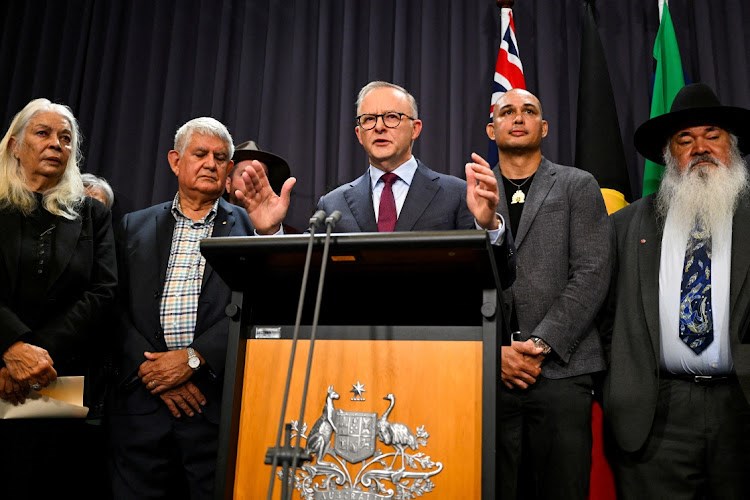Aboriginal 'Voice to Parliament' harrowed by Australian opposition
Only eight of the 44 referenda that have been held in Australia over the previous 120 years have been successful without backing from both main parties.
-

Australian Prime Minister Anthony Albanese, surrounded by members of the First Nations Referendum Working Group, speaks to the media during a news conference at Parliament House in Canberra, on March 23, 2023. (Reuters)
The conservative opposition party announced on Wednesday that it would fight the proposed constitutional amendments, dealing a significant blow to the campaign to recognize Aboriginal Australians in the nation's constitution.
The center-left government of Australia seeks to amend the constitution to give more influence to the Aboriginal people, who are disproportionately affected by poorer health, lower earnings, and higher incarceration rates.
Nevertheless, a plan to grant Aboriginal people the right to be consulted on the Voice to Parliament legislation that affects them must first receive the support of the general public in a legally-binding referendum later this year.
Hopes that Prime Minister Anthony Albanese's proposal would be supported by all parties were dashed when opposition leader Peter Dutton vehemently opposed it.
"It should be very clear to Australians by now that the prime minister is dividing the country," Dutton told journalists, before confirming he would campaign to ameliorate the plan.
Dutton claimed he backed constitutional recognition for Aboriginals in principle, but he could not support the government's proposal since it was divisive and lacked detail.
"I don't think this is in our country's best interest," he added.
Only eight of the 44 referenda that have been held in Australia over the previous 120 years have been successful without backing from both main parties.
According to polls, roughly 54% of Australians back the constitutional amendment, but support has been dwindling in light of lingering concerns about how the Voice will operate.
Albanese has formally painted it as a test of national character and whether Australians had the "confidence to embrace our history."
"What we have done up to now hasn't worked," he stated in January.
Aboriginal Australians are considered one of the oldest continuously existing cultures on the globe. They first populated the continent about 65,000 years ago.
Despite this, Indigenous peoples are currently unrecognized in Australia's constitution, and the move to enshrine a so-called "voice" - a consultative body to provide advice to the government on resolutions that would influence the marginalized group - in the document would necessitate a nationwide referendum.
In various provinces and territories, voting rights for Native Australians were restricted as recently as the 1960s.
If the referendum is successful, the Australian government will create an Indigenous advisory council with constitutional protections and the right to be consulted by parliament when crafting new laws.
"A Voice to Parliament, enshrined in our Constitution, will mean that our people are listened to and heard on the issues that affect us," Aboriginal Senator Patrick Dodson has stated previously.
Australia has long been unsuccessful to close the gap between the health and well-being of its Indigenous people and the rest of the people, with soaring imprisonment rates among First Nations people and a life expectancy lower than the national average by eight years.
Read: Museum of Sydney to transform into Aboriginal cultural space

 3 Min Read
3 Min Read








